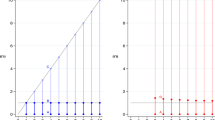Abstract
The unknown matrix M is the mean of the observed response matrix in a multivariate linear model with independent random errors. This paper constructs regularized estimators of M that dominate, in asymptotic risk, least squares fits to the model and to specified nested submodels. In the first construction, the response matrix is expressed as the sum of orthogonal components determined by the submodels; each component is replaced by an adaptive total least squares fit of possibly lower rank; and these fits are then summed. The second, lower risk, construction differs only in the second step: each orthogonal component is replaced by a modified Efron-Morris fit before summation. Singular value decompositions yield computable formulae for the estimators and their asymptotic and estimated risks. In the asymptotics, the row dimension of M tends to infinity while the column dimension remains fixed. Convergences are uniform when signal-to-noise ratio is bounded.
Similar content being viewed by others
References
Beran R. (1999). Superefficient estimation of multivariate trend. Mathematical Methods of Statistics 8: 166–180
Beran, R. (2007). Adaptive estimators of a mean matrix: total least squares versus total shrinkage. Econometric Theory, (in press).
Chatterjee S., Handcock M.S., Simonoff J.S. (1995). A casebook for a first course in statistics and data analysis. New York, Wiley
Efron B., Morris C. (1972). Empirical Bayes on vector observations: an extension of Stein’s method. Biometrika 59: 335–347
Fuller W.A. (1987). Error measurement models. New York, Wiley
Gleser L.J. (1981). Estimation in a multivariate “errors in variables” regression model: large sample results. Annals of Statistics 9: 24–44
Golub G.H., Van Loan C.F. (1980). An analysis of the total least squares problem. SIAM Journal on Numerical Analysis 17: 883–893
Golub G.H., Van Loan C.F. (1996). Matrix computations (3rd edition). Baltimore, Johns Hopkins University Press
Lütkepohl H. (1996). Handbook of matrices. Chicester, Wiley
Pinsker M.S. (1980). Optimal filtration of square-integrable signals in Gaussian noise. Problems of Information Transmission 16: 120–133
Stein C. (1956). Inadmissibility of the usual estimator for the mean of a multivariate normal distribution. In: Neyman J. (eds) Proceedings of the third Berkeley symposium on mathematical statistics and probability. Berkeley, University of California Press, pp 197–206
Stein C. (1966). An approach to the recovery of inter-block information in balanced incomplete block designs. In: David F.N. (eds) Festschrift for Jerzy Neyman. New York, Wiley, pp 351–364
Van Huffel S. (2004). Total least squares and errors-in-variables modeling: bridging the gap between statistics, computational mathematics and engineering. In: Antoch J. (eds) Compstat 2004: Proceedings in computational statistics. Heidelberg, Physica-Verlag, pp 539–555
Van Huffel S., Vandewalle J. (1991). The total least squares problem: computational aspects and analysis. Philadelphia, SIAM
Author information
Authors and Affiliations
Corresponding author
Additional information
This research was supported in part by National Science Foundation Grant DMS 0404547.
About this article
Cite this article
Beran, R. Estimating a mean matrix: boosting efficiency by multiple affine shrinkage. Ann Inst Stat Math 60, 843–864 (2008). https://doi.org/10.1007/s10463-007-0128-2
Received:
Revised:
Published:
Issue Date:
DOI: https://doi.org/10.1007/s10463-007-0128-2




